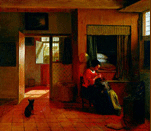










Craig Monson
Department of Music
Washington University in St. Louis
Carmen, cantus, cantio all imply, not only song, but also magical charm, incantation, enchantment, a direct connection that remains very much alive in many non-western cultures, but has commonly been lost in the modern west. An inherent ambivalence in the two meanings emerges in early modern attitudes toward one of the most prominent classes of early modern singers, much more common and familiar then than now: female monastics. Of course, detractors' language often played upon nuns' singing as dangerously "enchanting," especially perilous for hormonally rather than harmonically driven male auditors. To some extent the spaces nuns inhabited enhanced this effect: by keeping the singers separate, invisible, disembodied, convent architecture kept them secret, mysterious, and rendered their act of singing more powerful. The buildings designed to keep them apart and to render them "not of this world" enhanced their worldly enchantments. And nun singers found ways to make the most of it.
Recent research has made all this more familiar than it was a decade or so ago. Less widely known, perhaps, is the fact that monastic musical enchantresses sometimes were, or were perceived to be, quite literally, enchantresses: magical practitioners as well as musical practitioners. The paper also explores this uneasy mix, real and imagined, of convent music and magic, drawing upon diverse examples such as the case of a nun from Lecce, who in 1646 tried to cure herself by dancing the tarantella in the convent courtyard, or, most notably, the singing nuns at San Lorenzo in Bologna who were investigated by the Inquisition in 1584 for conjuring up the devil (successfully, some said) as part of a wide repertory of folk magical practices. The paper also ponders broader implications of the perceived perils of music and female power, as related to love and magic, and the intriguing fact that Venice's musically talented and dangerously alluring courtesans such as Veronica Franco were also accused of witchcraft, particularly love magic, involving the same repertory of black arts attributed to musical nuns.
|
|
|
||||||
|
|
 |
 |
|
||||
 |
|
 |
|
||||
|
|
|
||||||
|
|
|
||||||
 |
|
||||||
|
|
|
||||||
| |
|
||||||
 |
|
||||||
 |
|
||||||
 |
|
||||||
 |
|
||||||
|
|
|
||||||
|
|
 |
|
|
||||
 |
|
||||||
|
|
|
|
|
|
|
|
|